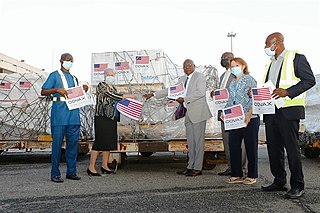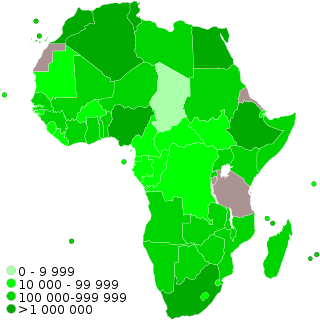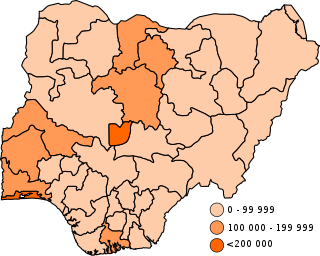 The US delivers Janssen COVID-19 vaccines as part of the COVAX program in 2021 | |
| Date | June 2, 2021 |
|---|---|
| Cause | COVID-19 pandemic |
Burkina Faso started vaccinating against COVID-19 on 2 June 2021. [1]
 The US delivers Janssen COVID-19 vaccines as part of the COVAX program in 2021 | |
| Date | June 2, 2021 |
|---|---|
| Cause | COVID-19 pandemic |
Burkina Faso started vaccinating against COVID-19 on 2 June 2021. [1]
Burkina Faso is in the works of securing additional vaccines. [2]
So far, the health system in Burkina Faso's health system has been under strain with dealing with the pandemic, leaving them unable to focus on vaccinations in the country. [3]
Burkina Faso received 115,200 doses of the Oxford–AstraZeneca COVID-19 vaccine on 30 May, courtesy of COVAX. [4]
Vaccinations started on 2 June. [5] By the end of the month 25,833 vaccine doses had been administered. [6]
In late July and early August, Burkina Faso received 302,400 doses of the Janssen COVID-19 vaccine donated by the United States through COVAX. [7] By the end of the month 35,402 vaccine doses had been administered. [6]
By the end of the month 98,670 vaccine doses had been administered. [6]
By the end of the month 254,545 vaccine doses had been administered. [6]
By the end of the month 393,427 vaccine doses had been administered while 3% of the targeted population had been fully vaccinated. [6]
By the end of the month 490,477 vaccine doses had been administered while 4% of the targeted population had been fully vaccinated. [6]
By the end of the month 1.05 million vaccine doses had been administered while 8% of the targeted population had been fully vaccinated. [6]
By the end of the month 1.3 million vaccine doses had been administered while 9% of the targeted population had been fully vaccinated. [6]
By the end of the month 2.3 million vaccine doses had been administered while 1.1 million persons had been fully vaccinated. [6]
By the end of the month 2.4 million vaccine doses had been administered while 1.2 million persons had been fully vaccinated. [6]
By the end of the month 2.9 million vaccine doses had been administered while 1.5 million persons had been fully vaccinated. [6]
Cumulative vaccinations
Graphs are unavailable due to technical issues. |

The COVID-19 pandemic in Benin was a part of the ongoing worldwide pandemic of coronavirus disease 2019 caused by severe acute respiratory syndrome coronavirus 2. The virus was confirmed to have reached Benin in March 2020.

COVID-19 Vaccines Global Access, abbreviated as COVAX, is a worldwide initiative aimed at equitable access to COVID-19 vaccines directed by the GAVI vaccine alliance, the Coalition for Epidemic Preparedness Innovations (CEPI), and the World Health Organization (WHO), alongside key delivery partner UNICEF. It is one of the four pillars of the Access to COVID-19 Tools Accelerator, an initiative begun in April 2020 by the WHO, the European Commission, and the government of France as a response to the COVID-19 pandemic. COVAX coordinates international resources to enable low-to-middle-income countries equitable access to COVID-19 tests, therapies, and vaccines. UNICEF is the key delivery partner, leveraging its experience as the largest single vaccine buyer in the world and working on the procurement of COVID-19 vaccine doses, as well as logistics, country readiness and in-country delivery.
On 29 January 2021, Algeria launched a COVID-19 vaccination campaign, a day after receiving its first shipment of 50,000 doses of the Russia's Sputnik V vaccine. As of 6 June 2021, around 2.5 million doses have been administered. Algeria is currently vaccinating its population with both Sputnik V and Oxford-AstraZeneca vaccines.
The COVID-19 vaccination in Morocco is an ongoing immunisation campaign against severe acute respiratory syndrome coronavirus 2 (SARS-CoV-2), the virus that causes coronavirus disease 2019 (COVID-19), in response to the ongoing pandemic in the country.
COVID-19 vaccination in Angola is an ongoing immunisation campaign against severe acute respiratory syndrome coronavirus 2 (SARS-CoV-2), the virus that causes coronavirus disease 2019 (COVID-19), in response to the ongoing pandemic in the country. As of 15 June 2021, Angola has administered 1,314,375 doses of vaccines.822,109 people with the first dose and 492,266 people fully vaccinated. Angola began their vaccination program shortly after receiving their first shipment of Oxford AstraZeneca vaccine in early March 2021.
COVID-19 vaccination in Botswana is an ongoing immunisation campaign against severe acute respiratory syndrome coronavirus 2 (SARS-CoV-2), the virus that causes coronavirus disease 2019 (COVID-19), in response to the ongoing pandemic in the country.
Cape Verde has begun vaccinations against COVID-19.
On 23 February 2021, Senegal began its national vaccination program against the COVID-19. As of 10 March, 68,205 people in Senegal have been able to be vaccinated.

COVID-19 vaccination programs are ongoing in the majority countries and territories in Africa, with 51 of 54 African countries having launched vaccination programs by July of 2021. As of October 2023, 51.8% of the continent's population is fully vaccinated with over 1084.5 million doses administered.

COVID-19 vaccination in Ghana began on Monday 1 March 2021 after the country became the first recipient of the Oxford-AstraZeneca COVID-19 vaccine as part of the COVAX initiative. As of 6 June 2021, Ghana has administered 1,230,000 vaccine doses.

COVID-19 vaccination in Nigeria is an ongoing immunization campaign against severe acute respiratory syndrome coronavirus 2 (SARS-CoV-2), the virus that causes coronavirus disease 2019 (COVID-19), in response to the ongoing pandemic in the country. Vaccination began on 5 March 2021. As of 28 February 2022, 17,914,944 people have received their first dose a COVID-19 vaccine, and 8,197,832 have received their second dose.
COVID-19 vaccination in Burundi is an ongoing immunisation campaign against severe acute respiratory syndrome coronavirus 2 (SARS-CoV-2), the virus that causes coronavirus disease 2019 (COVID-19), in response to the ongoing pandemic in the country. Burundi was one of the last nation states in the world to commence vaccination against COVID-19. This was mostly due to the government's refusal to vaccinate the population throughout most of 2021. In February 2021, Thaddee Ndikumana, the health minister of Burundi, said his country was more concerned with prevention measures. "Since more than 95% of patients are recovering, we estimate that the vaccines are not yet necessary," local media reported.
COVID-19 vaccination in Cameroon is an ongoing immunisation campaign against severe acute respiratory syndrome coronavirus 2 (SARS-CoV-2), the virus that causes coronavirus disease 2019 (COVID-19), in response to the ongoing pandemic in the country.
COVID-19 vaccination in Chad is an ongoing immunisation campaign against severe acute respiratory syndrome coronavirus 2 (SARS-CoV-2), the virus that causes coronavirus disease 2019 (COVID-19), in response to the ongoing pandemic in the country.
COVID-19 vaccination in Djibouti is an ongoing immunisation campaign against severe acute respiratory syndrome coronavirus 2 (SARS-CoV-2), the virus that causes coronavirus disease 2019 (COVID-19), in response to the ongoing pandemic in the country.
COVID-19 vaccination in Egypt is an ongoing immunisation campaign against severe acute respiratory syndrome coronavirus 2 (SARS-CoV-2), the virus that causes coronavirus disease 2019 (COVID-19), in response to the ongoing pandemic in the country.
COVID-19 vaccination in Eswatini is an ongoing immunisation campaign against severe acute respiratory syndrome coronavirus 2 (SARS-CoV-2), the virus that causes coronavirus disease 2019 (COVID-19), in response to the ongoing pandemic in the country.
COVID-19 vaccination in the Central African Republic is an ongoing immunisation campaign against severe acute respiratory syndrome coronavirus 2 (SARS-CoV-2), the virus that causes coronavirus disease 2019 (COVID-19), in response to the ongoing pandemic in the country.
COVID-19 vaccination in the Democratic Republic of the Congo is an ongoing immunisation campaign against severe acute respiratory syndrome coronavirus 2 (SARS-CoV-2), the virus that causes coronavirus disease 2019 (COVID-19), in response to the ongoing pandemic in the country.
The COVID-19 vaccination campaign began in Fiji on the first quarter of 2021 and will continue throughout the year with the goal of vaccinating all eligible Fijians. The government has made it mandatory for all eligible adults to take the COVID-19 vaccines.